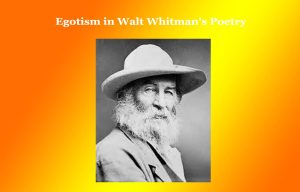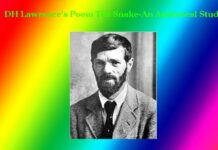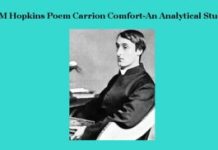Egotism in Walt Whitman’s Poetry
Egotism in Walt Whitman’s Poetry
Egotism in Walt Whitman’s Poetry
‘Ego’ refers to the sense of self (self-esteem) or ‘I’, the first person singular. ‘Egotism’ means ‘self-exaltation’ and hence ‘egotist’ is a person who often talks about himself, using the first person singular. In other words, an egotist is in love with himself and considers himself to be much more important. In this sense, Walt Whitman is a thorough egotist, because he has talked much about himself in his poetry. He considers himself to be much important person in a society where he always talks of his own personality, his own likings or disliking, his universal humanity, his equalitarianism and about his own mystic vein in his own body, soul and God. But his egotism is all-embracing that symbolizes every human being.
His ‘Song of Myself’ is replete with his egotism. This poem begins with self-exaltation with universal appeal and says:
”I celebrate myself and sing myself
And what I assume, you shall assume
For every atom belonging to me as good belongs to you.”
There are both good and bad within him. He is a microcosm of the universe including all men and women. He says:
”Clear and sweet is my soul and
Clear and sweet is all that is not my soul
……………………………………
Welcome is every organ and attribute of
Me, and of many man hearty and clean.”
The poet is so much in love with himself that he always remembers that he is much more important in society. He says:
”It is for mouth forever, I am in love with it
…………………………………
I am mad for it to be in contact with me.”
In section 20 of ‘Song of Myself,’ he declares that he himself is a better being in human society and thinks that he is the being who can see himself in all people. He says:
”I find no sweeter fat that sticks to my own bones
………………………………
In all people I see myself
And I know I am solid and sound
I know I am deathless
I exist as I am—that is enough.”
In section 24 of ‘Song of Myself’ he says about his own nature, as—
”Walt Whitman am I, a Kosmos of mighty Manhattan
the son,
Turbulent, fleshy and sensual, eating, drinking and breeding
No sentimentalist—no stander above men and women,
or apart from them;
No more modest than immodest.”
The poet glorifies himself not as a general man but as a divine being. He says in the same section of the ‘Song of Myself’:
”Divine am I inside and out and I make holy whatever
I touch and am touched from
The scent of these arm-pits aroma finer than prayer,
This head more than churches, bibles
And all the creeds.
If it worships one thing more than another
It shall be the spread of my own body or any part of it.”
In section 42 of the same poem, he says about his own egotism as—
‘‘I know perfectly my own egotism
I know my omnivorous line and must not write any less.”
In section 5, he expresses his mystic view on God along with his universal brotherhood, as:
”And I know that the hand of God is
the promise of my own
And I know that the spirit of God is the brother of my own.
And that all the men ever born are also
My brothers and the women my sisters and lovers.”
In section 21 of the poem, the poet glorifies himself as a poet of the soul and of the body and of men and women, as—
”I am the poet of the body and I am the poet of the soul
The pleasures of heaven are with me
and the pains of the hell are with me.”
In man, there is the nature of wild beings also. The poet admits and desires to live with animals:
”I think I could turn and live with animals,
They are so placid and self-contained
I stand and look at them long and long.
They don’t sweat and whine about their condition,
They don’t lie awake in the dark and weep for their sins,
They do not make me sick discussing their duty to God.”
In the poem entitled ‘The Sleepers’, he identifies himself with all classes of people and says:
”I am the actor, the actress, the voter, the politician
The immigrant and the exile, the criminal
that stood in the box
He who has been famous and he who shall be
famous after today.”
The poet thinks that he is better and larger than others. He says in the ‘Song of the Open Road’ :
”I inhale great draughts of space
The east and the west are mine and
the north and the south are mine
I am larger, better than I thought
I did not know, I held so much goodness.”
The poet sings the ideals of democracy through his own mouth and hence his egotism develops to universality:
”Oneself I sing a simple separate person
Yet after the word democratic, the word En-Masse.”
The above quote lines are examples taken at random. To say in brief, his every poem is a record of himself with an animal appeal. Almost all his poems begin with the word ‘I’, the first person singular and from the beginning to the end he always talks about himself. There are poets and poets who write in the first person singular, but Walt Whitman is an exception. He is the most egoist of all poets that have trodden the Earth till today—because he leaves nothing of himself to get portrayed in his poems. 0 0 0 . Egotism in Walt Whitman’s Poetry
Egotism in Walt Whitman’s Poetry
N.B. The article ‘Egotism in Walt Whitman’s Poetry’ originally belongs to the book ‘Walt Whitman’s Poetry A Thematic Study‘ by Menonim Mennimus. Egotism in Walt Whitman’s Poetry. Egotism in Walt Whitman’s Poetry











